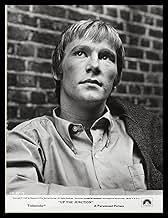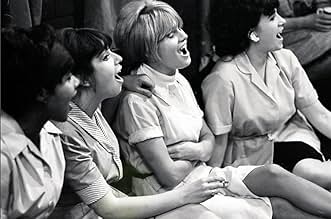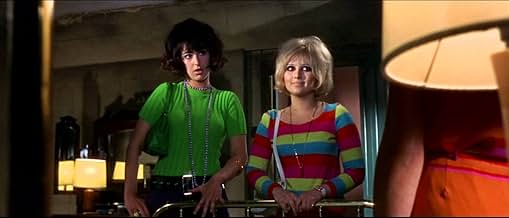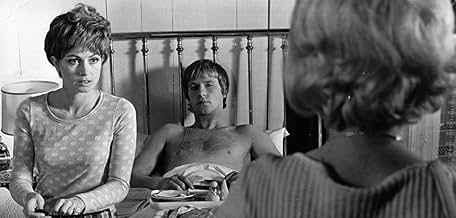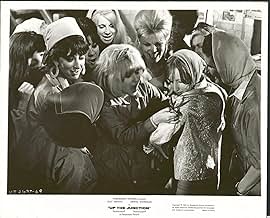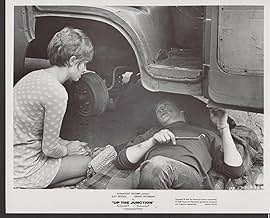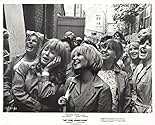IMDb RATING
6.9/10
1.1K
YOUR RATING
Addresses some of the major 60s social issues - a bored rich London-girl from Chelsea decides to go "slumming" in depressed Battersea, getting a flat and starts factory-work and makes friend... Read allAddresses some of the major 60s social issues - a bored rich London-girl from Chelsea decides to go "slumming" in depressed Battersea, getting a flat and starts factory-work and makes friends... of which one has to get an illegal abortion.Addresses some of the major 60s social issues - a bored rich London-girl from Chelsea decides to go "slumming" in depressed Battersea, getting a flat and starts factory-work and makes friends... of which one has to get an illegal abortion.
- Awards
- 1 nomination total
- Director
- Writers
- All cast & crew
- Production, box office & more at IMDbPro
Featured reviews
I first saw this film on late night TV in Melbourne, Australia, in the late 1980s. I love it then, but wasn't able to view it again until recently, and enjoyed it as much as my first viewing almost 30 years earlier.
One of the first things I remembered thinking after first viewing it is – why isn't this film better known? It's one of the great British films of the 1960s, and a fine example of the 'kitchen sink' genre. Added to that, it has superb widescreen cinematography – every scene is beautifully shot, the outdoor scenes particularly so. Working class London in the 60s was a ramshackle, beautiful if run-down environment. The film captures a lost world – it's a fascinating historical document as well as a serious movie.
The cast is spot on,it's all very believable, and the leads have a genuine chemistry. Suzy Kendall may have had a limited acting range – but she's perfect in this role. And so beautiful!
The story tackles all manner of social problems not just of the 60s, but universal ones applicable today as then. Some scenes are still quite disturbing to watch – this is not some 'swinging London' expose, but an accurate glimpse in to the life of working class Londoners before the gentrification process started.
I was fortunate to study British film at Monash Univeristy (Melbourne) under the great Brian MacFarlane in the 1990s. He's considered the world expert on British cinema, and was commissioned by the British Film Academy to write the authorised history of British cinema. One of the things MacFarlane consistently highlighted was the fact Brit film only began to portray the working class seriously from the late 1950s. Prior to that, working class were portrayed in movies as either servants, idiots, criminals or downtrodden miners etc. Up the Junction is a beautifully realised example of a time when the British finally began to take the working class seriously.
It's also the first film I can think of with a soundtrack written by a well known rock band – Manfred Mann. And though dated – the music is perfect for this film and captures something of the youth vibe then flowering across the western world. Truly – this is a shamefully underrated film and a must-see for anyone interested in London in the 1960s.
One of the first things I remembered thinking after first viewing it is – why isn't this film better known? It's one of the great British films of the 1960s, and a fine example of the 'kitchen sink' genre. Added to that, it has superb widescreen cinematography – every scene is beautifully shot, the outdoor scenes particularly so. Working class London in the 60s was a ramshackle, beautiful if run-down environment. The film captures a lost world – it's a fascinating historical document as well as a serious movie.
The cast is spot on,it's all very believable, and the leads have a genuine chemistry. Suzy Kendall may have had a limited acting range – but she's perfect in this role. And so beautiful!
The story tackles all manner of social problems not just of the 60s, but universal ones applicable today as then. Some scenes are still quite disturbing to watch – this is not some 'swinging London' expose, but an accurate glimpse in to the life of working class Londoners before the gentrification process started.
I was fortunate to study British film at Monash Univeristy (Melbourne) under the great Brian MacFarlane in the 1990s. He's considered the world expert on British cinema, and was commissioned by the British Film Academy to write the authorised history of British cinema. One of the things MacFarlane consistently highlighted was the fact Brit film only began to portray the working class seriously from the late 1950s. Prior to that, working class were portrayed in movies as either servants, idiots, criminals or downtrodden miners etc. Up the Junction is a beautifully realised example of a time when the British finally began to take the working class seriously.
It's also the first film I can think of with a soundtrack written by a well known rock band – Manfred Mann. And though dated – the music is perfect for this film and captures something of the youth vibe then flowering across the western world. Truly – this is a shamefully underrated film and a must-see for anyone interested in London in the 1960s.
This movie had a profound effect on me when I first craned my neck to see it from the front row of the Haymarket cinema in Newcastle upon Tyne. I was sixteen years old and on date with a guy that had a rich father, a triumph spitfire and the personality of deadwood. I fell deeply in love with Suzy Kendall knowing that it should have been Dennis Waterman. I saw this movie every night for two weeks. It captures those times exquisitely, almost painfully. I just need to hear the opening theme to be transported back. The clash of cultures, the poverty on both sides of the class divide. Polly had money but was surrounded by shallowness and snobbery. Her friends up the junction had loyalty, camaraderie and fun, but struggled to survive, scamming their way from pay day to pub, who was the poorer? Manfred Mann's excellent score insinuates it's way into the fabric of the movie, haunting and evocative. Give this one a chance, you won't regret it.
An absolute must see for all lovers of 1960's culture. Not only does it boast some of the decades finest actors, it has a beautiful soundtrack from Manfred Mann and the cinematography perfectly captures the feel of what it was like to live in that decade. The plotline also deals with some of the pressing social issues of the time as well, including a very sensitive portrayal of back street abortion, the only one coming even slightly close to the masterly "Alfie". Even watching this film now, I think you can really get a feel for what it was like to be young and working class in the 1960's. Great Stuff.
Peter Collinson was already mellowing after his directorial debut with the incredibly nasty home invasion film 'The Penthouse' (1967); and let loose on Nell Dunn's stories in Technicolor with Manfred Mann on the soundtrack was obviously going to turn in a very different film from Ken Loach's 'Wednesday Play' of 1965.
What seemed like gritty realism in 1967 today seems as remote as the world evoked by Dickens (complete with Jewish stereotypes which really date it). Maureen Lipman is almost unrecognisably young and it's always good to see Adrienne Posta and Liz Fraser (who share a literally gut-renching sequence after the former has an abortion performed by a drunken Hylda Baker).
But the real star is Battersea power station, looming in the background back in the days when it was still permitted to smoke.
What seemed like gritty realism in 1967 today seems as remote as the world evoked by Dickens (complete with Jewish stereotypes which really date it). Maureen Lipman is almost unrecognisably young and it's always good to see Adrienne Posta and Liz Fraser (who share a literally gut-renching sequence after the former has an abortion performed by a drunken Hylda Baker).
But the real star is Battersea power station, looming in the background back in the days when it was still permitted to smoke.
Though justifiably not considered a particularly important British film of the late sixties, "Up The Junction" has much genuine charm and remains a film for which I have a lot of affection.
Written by Nell Dunn, who specialized in portraying working class life, the characters are well drawn and brought to life with much conviction by a fine cast, some of whom have lasted and some who somehow faded away.
Whereas leading man Dennis Waterman went on to a long career in both television and on the stage, the lovely Suzy Kendall, who seemed to be headed towards becoming the next Julie Christie, proceeded to an undistinguished career. There's a touching chemistry between the pair.
Likewise the strong supporting players have had varied careers. The pairing of Maureen Lipman and Andrienne Posta was so successful in this film, that there was talk of them becoming a comedy team. Like Waterman, Lipman has been a regular on television and the stage, while Posta simply vanished.
"Up the Junction" too has vanished into obscurity, without even a video release. It's odd that while other far lesser British movies of the same period have been kept alive, this small but very appealing work should suffer such a fate.
Written by Nell Dunn, who specialized in portraying working class life, the characters are well drawn and brought to life with much conviction by a fine cast, some of whom have lasted and some who somehow faded away.
Whereas leading man Dennis Waterman went on to a long career in both television and on the stage, the lovely Suzy Kendall, who seemed to be headed towards becoming the next Julie Christie, proceeded to an undistinguished career. There's a touching chemistry between the pair.
Likewise the strong supporting players have had varied careers. The pairing of Maureen Lipman and Andrienne Posta was so successful in this film, that there was talk of them becoming a comedy team. Like Waterman, Lipman has been a regular on television and the stage, while Posta simply vanished.
"Up the Junction" too has vanished into obscurity, without even a video release. It's odd that while other far lesser British movies of the same period have been kept alive, this small but very appealing work should suffer such a fate.
Did you know
- GoofsWhen Sylvie and Rube are singing in the pub, there are many cutaways which show the pub customers joining in the songs. On most of these, a large piece of dirt is visible at the top of the frame. Someone didn't perform the obligatory "hair in the gate" check before loading the film.
- ConnectionsFeatured in Film Review: Backs British Films (1968)
- SoundtracksUp The Junction (Main Title)
Written by Mike Hugg and Manfred Mann
- How long is Up the Junction?Powered by Alexa
Details
- Release date
- Country of origin
- Language
- Also known as
- Чуть выше по перекрёстку
- Filming locations
- Beach Hotel, Marine Parade, Worthing, West Sussex, England, UK(hotel where Pete and Polly stay)
- Production companies
- See more company credits at IMDbPro
- Runtime1 hour 59 minutes
- Sound mix
- Aspect ratio
- 2.35 : 1
Contribute to this page
Suggest an edit or add missing content


